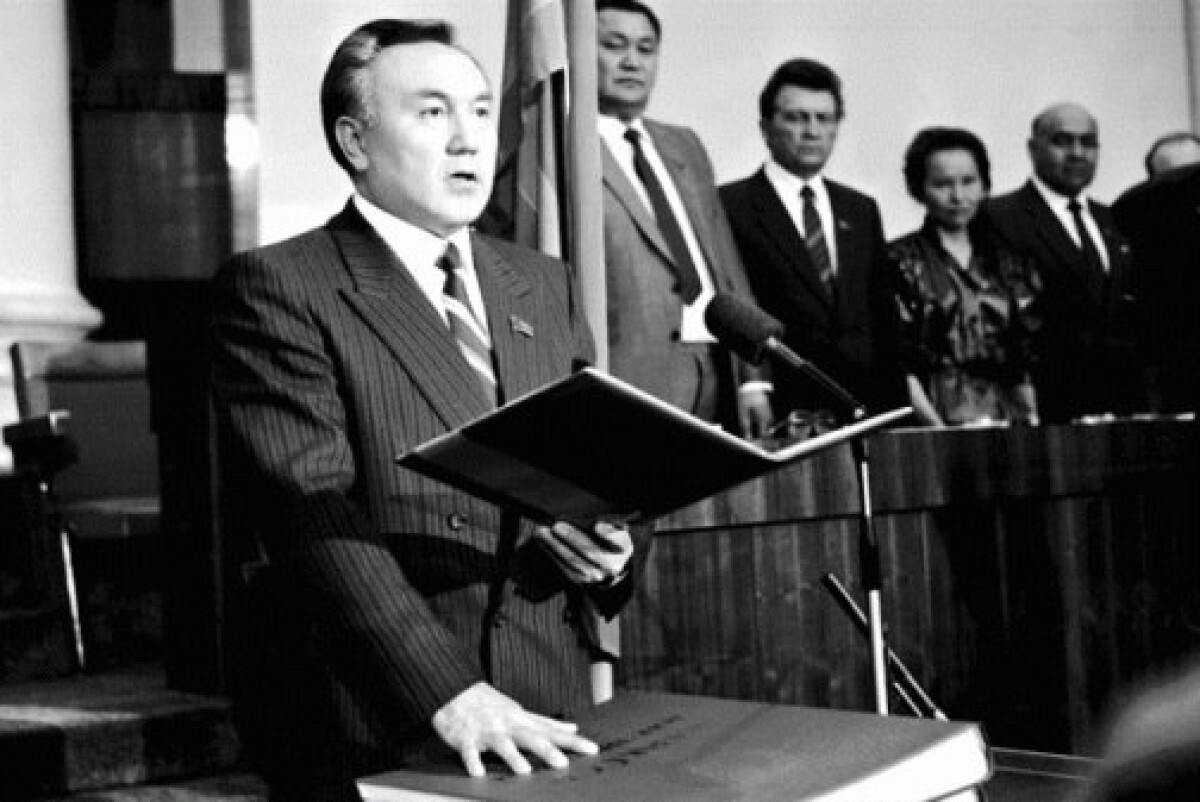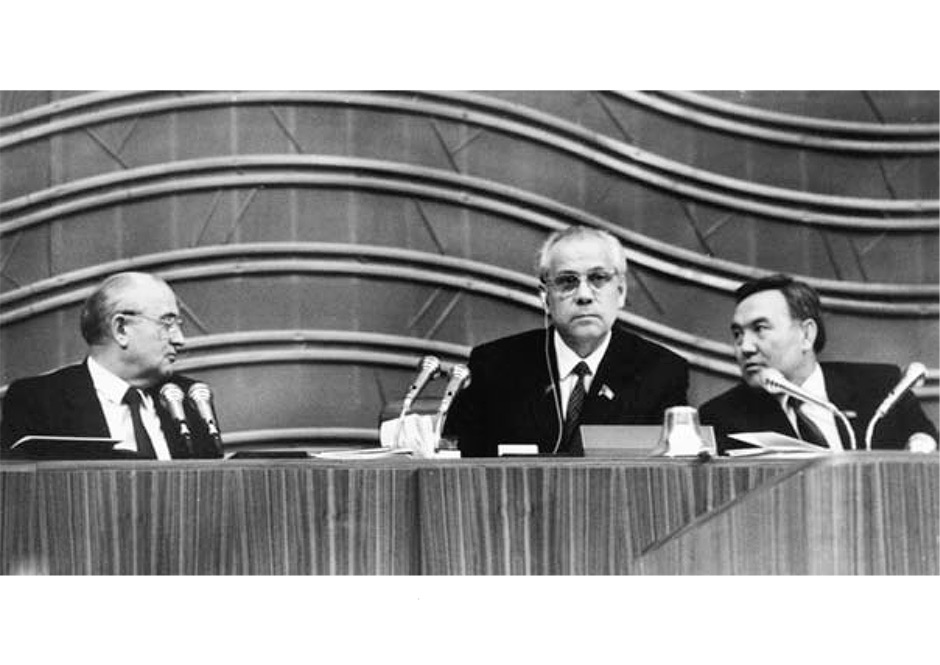
In 1990, in the political atmosphere, the first sensations of approaching the collapse of the Soviet Union appeared. Nursultan Nazarbayev faced a difficult choice: to preserve Kazakhstan in the socialist system or move towards economic independence? The decision was taken firmly: to move to civilized market relations, despite the disappointing forecasts of economists and analysts.
In crisis conditions, work was actively carried out to overcome the raw material orientation of the republic, to strengthen horizontal intra-union economic ties, to preserve a single economic space, which would strengthen the relationship between the union republics. During this period, the head of the republic took an active part in drafting the most important draft laws of the republic: on property, land, self-government, foreign economic activity, foreign investment, free economic zones. The newly created legislative base allowed the republic to be among the first to prepare for the trials that followed the collapse of the USSR.
The sharpest crisis in the republic required active action on the part of the leadership. Kazakhstan's deputies understood this, completely entrusting the fate of the republic to N.A. Nazarbayev. In February 1990, at the ХVІ session of the Supreme Council of the Kazakh SSR of the eleventh convocation, they elected him Chairman of the Supreme Council of the Kazakh SSR. His first deputy was Sergey Tereshchenko.
The combination of two posts - the First Secretary of the Central Committee of the Communist Party of Kazakhstan and the Chairman of the Supreme Council of the Republic - was not easy for N.A. Nazarbayev. What prompted him to accept this proposal? He replied:
"In the ... transition period, it is extremely important not to hesitate, not to miss the moment of implementing fundamentally important state decisions. Life itself today does not give time for swing. Tomorrow it will be too late to do what the present situation requires. And the process of transferring power to the Soviets has been somewhat delayed. That is why, having weighed all the pros and cons, I accepted the proposal to head the Supreme Council of the republic, without waiting for the election of its new composition, I think that this is dictated by the logic of the development of events in public and political life."
Speaking at the session, he voiced his political platform: "I see priority areas in the continuation and activation of the already begun renewal of the political, socio-economic, spiritual life of the republic. All our activities should be permeated with concern for people, about providing them with decent living and working conditions, establishing the principles of social justice, and expanding opportunities for the all-round development of the individual. Unfortunately, - he continued, - today we have to look back at the reaction of the allied ministries, to put up with their "appetites", which sometimes do not know the limit. The republic, as you know, owns only 7.5% of the volume of industrial production on its territory, the rest is at the disposal of the center. Therefore in the near future it is necessary to put an end to this injustice."
The political situation in the country was heated. Confrontation between the center and the republics intensified. Remaining the head of collegial bodies - in the post of General Secretary of the CPSU Central Committee and Chairman of the Supreme Soviet of the USSR, M.S. Gorbachev sought to strengthen his position in the system of power.
In March 1990, the Politburo of the CPSU Central Committee was discussing the issue of introducing the post of president of the USSR. Doubts about the republics and their relationship to this innovation in the discussion of the issue at the Congress of Deputies expressed the Chairman of the USSR Council of Ministers N.I. Ryzhkov: "No, it's not a matter of deputies; it's a matter in the republics".
March III Extraordinary Congress of People's Deputies of the USSR in 1990 elected M.S. Gorbachev President of the USSR. The Congress abrogated the sixth article of the Constitution which formalized in legislation the monopoly of the CPSU on power in the country. As time showed, the introduction of the post of the president of the USSR did not help M.S. Gorbachev control the situation in the country and save the Union. Political processes and the socio-economic crisis were gaining momentum.
By April 1990, Nursultan Nazarbayev had a clear idea that "internal" sovereignty would be incomplete without foreign economic, currency sovereignty. Entering the international market, creating joint ventures with the participation of foreign partners - this is also an important way of economic independence. In carrying out such a policy, he saw one of his immediate tasks.
"Only through defending their legal rights will the republic protect its interests."

On April 24, 1990, the Supreme Council introduced amendments and additions to the current Constitution and established the post of president of the Kazakh SSR. This was not just a trend of the time, but an overriding structural necessity. Deputies of the Supreme Council unanimously elected N.A. Nazarbayev the first president of the Kazakh SSR. The post of president was implanted in the existing system.
The election of N.A. Nazarbayev to the presidency by overwhelming majority of votes allows us to state that the electorate wanted to see him as their leader. His election program inspired hopes for an effective solution of the internal problems of the republic. Kazakhstanis knew that the president is able to firmly defend the interests of the republic and adequately represent Kazakhstan in the Union and the international community.
At the first session of the Supreme Council of the Kazakh SSR of the twelfth convocation, N.A. Nazarbayev, already as president of the Kazakh SSR, said that the subject of special concern "will be the adoption of measures to strengthen the national statehood, political sovereignty of the Kazakh SSR, filling it with a new, real content within the framework of Soviet Socialist Federation, for a clearer division of powers between the USSR and the republic."
The President of Kazakhstan is one of those rare leaders who tried to express his true thoughts, speak the truth, whatever it was. For example, talking about the transition to market relations, he was frank: "We must be prepared for the fact that at the initial stage ... in the first 1.5-2 years we expect significant losses, a decrease in the standard of living of the population and other negative aspects. We must understand that we do not have another way of a sharp rise in the economy, a breakdown in the structure of dictate and monopoly. We must consciously go for a sharp turn in the public consciousness, creating an atmosphere of universal interest and business initiative, widely explaining the essence of the issue to people." With these words he tried to prepare the people of Kazakhstan for the upcoming tests.
By virtue of the center, no one believed. For Kazakhstan this situation was especially dramatic. The head of state understood then that sooner or later, and most likely, soon enough the republic would have to embark on an independent economic voyage. His environment and parliament, he also set up an open confidential dialogue with the public.
Z. Fedotova, Deputy Chairman of the Supreme Council of the Kazakh SSR in the period from 1990 to 1994, describes the difficult months in the republic:
"The president demanded from us to go out to the streets, explain the current policy and prospects for Kazakhstan's development, invite the demonstrators to exchange views and etc. Nursultan Nazarbayev often spoke about the fact that only together, while maintaining stability in society, we will be able to avoid inter-ethnic, inter-confessional conflicts and preserve a unitary state - the Republic of Kazakhstan."
Nazarbayev understood that he simply had to say unpopular things in the interests of the psychological health of society, because public consciousness can not be based on stereotypes and lies. It is no coincidence that the President of Kazakhstan in May 1990 said: "I am worried about swinging our society to the right or the left. Especially to the right, that is, to the state in which we recently stayed. It's impossible. It will not happen". In the last words there was a capacious clear position of the citizen, the leader of the republic entrusted to him by the people.
At the end of 1990, the relationship between the center and the republics was finally exacerbated. Central authorities, concerned on the preservation of their power, did not want to listen to constructive proposals "from below." The Republic, in turn, sought to get rid of the guardianship of the center and demanded complete independence. The coexistence of a command and administrative system with new market realities for the USSR has created chaos in the country, which subsequently led to the "parade of sovereignties."
The events in the USSR in 1990 clearly demonstrated the powerlessness of the leadership of the Soviet Union in governing the country, its inability to cope with the crisis situation, and, most importantly, its reluctance to reform the socio-economic system. The course of the Soviet government for perestroika reforms under the slogans of acceleration, glasnost, democratization, proclaimed in April 1985, led the country into a dead end.
Translated by Raushan MAKHMETZHANOVA
